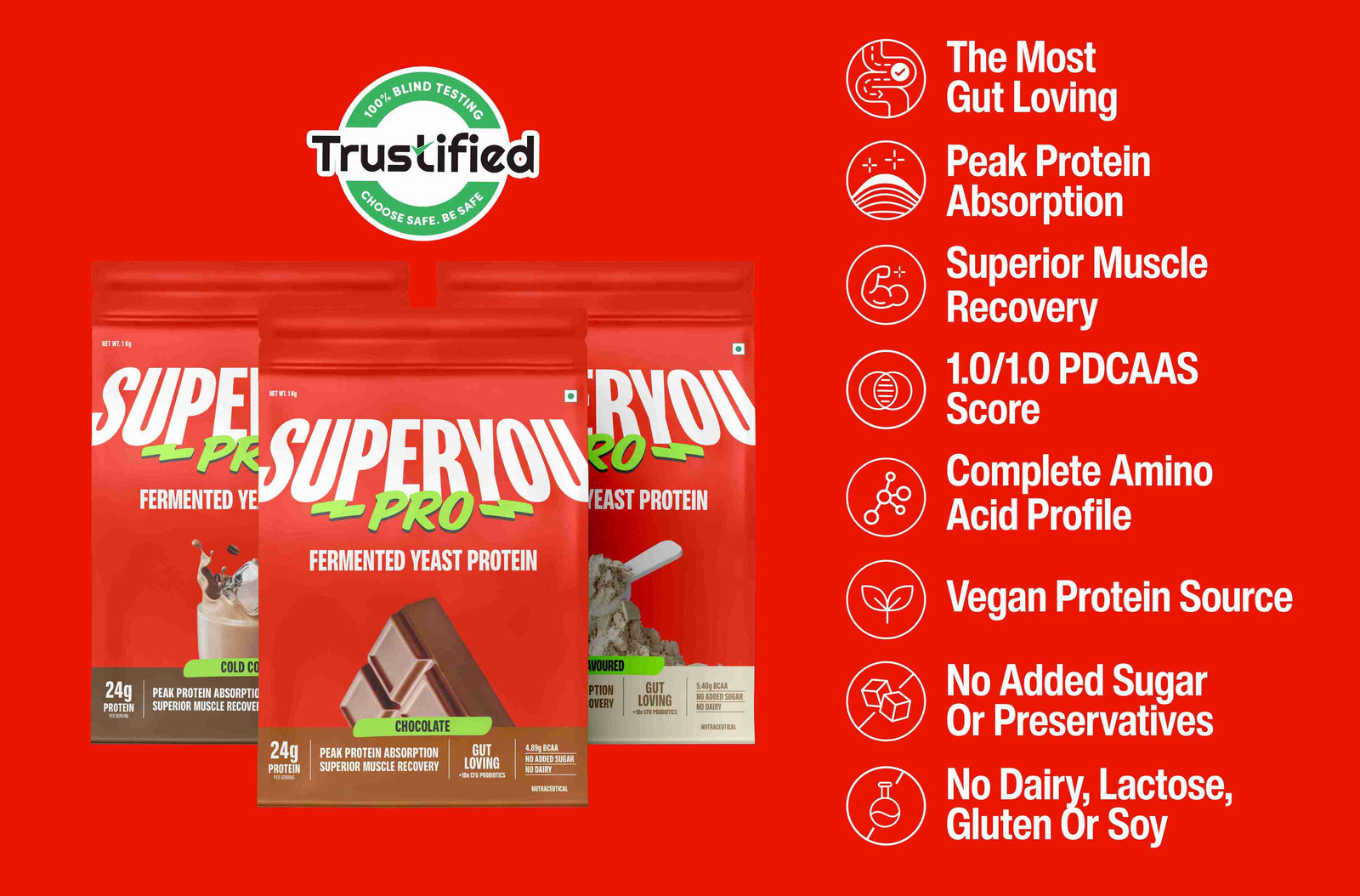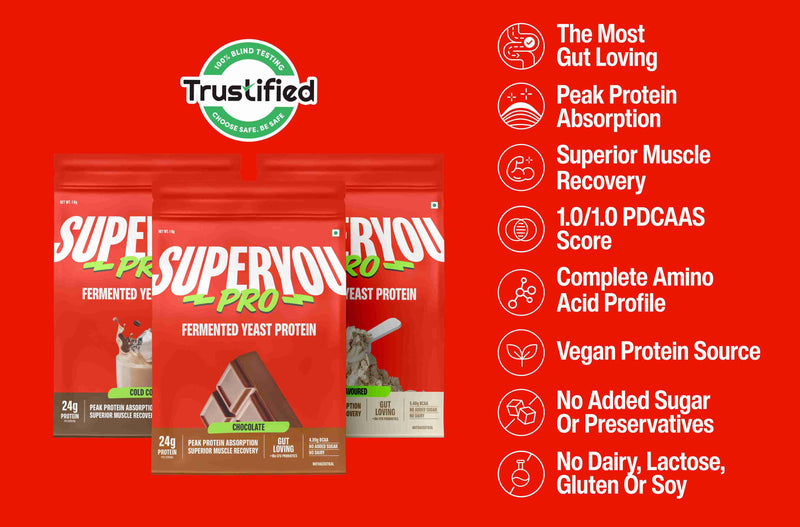Picture this: while fitness influencers debate rice-and-pea combinations and nutritionists argue over bioavailability charts, food scientists have been quietly perfecting something extraordinary. Hidden in controlled fermentation chambers, the same microorganism that transforms grape juice into wine and flour into sourdough has been engineered to address veganism's most persistent challenge: complete, effortlessly digestible protein.
This isn't about finding yet another plant to pulverise into powder. Fermented yeast protein represents a fundamental shift in how we think about nutrition itself. Derived from Saccharomyces cerevisiae through precision biofermentation, it delivers what traditional vegan proteins simply can't: a complete amino acid profile that rivals whey, digestibility that puts plant proteins to shame, and none of the ethical compromises that keep conscious consumers awake at night.
The revolution isn't coming, it's already here, brewing in laboratories where ancient fermentation wisdom meets cutting-edge nutritional science.
The Vegan Protein Predicament
Let's address the elephant in the room. Recent research confirms that achieving high protein quality remains challenging in vegan diets, with studies showing that up to 83% of vegans following strict plant-based diets may have protein intake below estimated average requirements. The culprit? Most plant proteins are incomplete, lacking sufficient quantities of essential amino acids, particularly lysine, the branched-chain amino acids leucine and valine, and sulphur-containing amino acids.
Traditional plant proteins require strategic food combining to deliver complete amino acid profiles. While this isn't impossible, it demands nutritional expertise that most people simply don't have. Danish research examining vegan diets found that food intake was particularly limited by essential amino acids, such as lysine, and sulfur-containing amino acids, as well as leucine and valine, precisely because participants ate only a limited number of protein sources daily.
This is where the protein conversation gets interesting.
The Three Protein Categories That Matter
When evaluating protein sources, there are fundamentally three categories worth your attention:
Whey protein provides a complete amino acid profile with rapid absorption, boasting a Protein Digestibility-Corrected Amino Acid Score (PDCAAS) of 1.0. However, it's derived from dairy, making it unsuitable for vegans, and often triggers digestive issues due to lactose content and rapid absorption rates.
Plant protein sources, such as pea, hemp, and soy, offer vegan-friendly options but typically score lower on digestibility metrics due to anti-nutritional factors like phytic acid and trypsin inhibitors. Research indicates that plant proteins typically have lower PDCAAS scores than animal proteins, primarily due to their unbalanced amino acid composition and reduced bioavailability.
Fermented yeast protein represents an entirely new category: a complete protein derived from Saccharomyces cerevisiae through precision biofermentation. This isn't plant or animal protein; it's microbial protein that combines the complete amino acid profile of whey with the ethical advantages of plant-based nutrition.
Why Fermented Yeast Protein Changes Everything
The biofermentation process transforms simple yeast cells into nutritional powerhouses. Fermented yeast protein achieves a PDCAAS score of 1.0, matching the gold standard of whey protein while remaining completely vegan-friendly.
The amino acid profile is remarkable. Fermented yeast protein contains approximately 7.5 grams of leucine per 100 grams of protein, comparable to whey protein and significantly higher than most plant proteins. This matters enormously because leucine serves as the primary trigger for muscle protein synthesis, making it crucial for anyone serious about fitness performance and recovery.
What sets fermented yeast protein apart is its digestibility profile. Unlike plant proteins that can trigger digestive discomfort due to complex carbohydrates and anti-nutritional factors, fermented yeast protein powder undergoes a controlled fermentation process that breaks down potential irritants while enhancing nutrient bioavailability. The branched-chain amino acid (BCAA) content is equally impressive. Fermented yeast protein contains approximately 18.62% BCAAs, including optimal ratios of leucine, isoleucine, and valine: the trio essential for muscle recovery and athletic performance.
The Gut-Friendly Advantage
Here's where fermented yeast protein truly excels: digestive compatibility. Studies indicate that fermented yeast protein offers slow-digesting characteristics, providing a steady release of amino acids over several hours rather than the rapid spike-and-crash pattern associated with whey protein.
This sustained release of amino acids serves dual purposes. First, it maintains elevated muscle protein synthesis for extended periods, optimising recovery and adaptation. Second, it enhances satiety, helping regulate appetite and support weight management goals.
The fermentation process also produces beneficial compounds, such as beta-glucans, which support immune function while promoting the growth of healthy gut bacteria populations. This means you're not just getting protein, you're supporting your entire digestive ecosystem.
Practical Application: Making It Work
For vegans seeking optimal protein nutrition, fermented yeast protein eliminates the guesswork. Unlike plant proteins, which require strategic combining to achieve a complete amino acid profile, fermented yeast protein delivers everything you need in a single serving.
Why It Works: The biofermentation process ensures consistent amino acid ratios that mirror human nutritional requirements. You're not dependent on consuming multiple protein sources throughout the day or mastering the art of combining complementary proteins.
Consider this: a single serving of fermented yeast protein provides the same essential amino acid profile as carefully planned combinations of rice and beans, nuts and grains, or lentils and seeds, but with superior digestibility and none of the potential digestive complications.
The sustainability factor is equally compelling. Fermented yeast protein production requires significantly less land, water, and energy compared to traditional plant protein farming, while producing 20 times fewer carbon emissions than whey protein and maintaining independence from seasonal agricultural constraints.
Engineered for Excellence
The beauty of fermented yeast protein lies in its precision. Where traditional protein sources are subject to natural variations in amino acid content, growing conditions, and processing quality, biofermentation creates consistent, optimised nutrition every single time. This makes it an ideal choice for vegans who refuse to compromise on performance or convenience.
SUPERYOU's commitment to fermented yeast protein represents more than ingredient innovation; it's a recognition that modern nutrition demands precision, not approximation. When your goals include optimal health, peak performance, and ethical consumption, you need protein that delivers on all fronts without requiring a degree in nutritional science to implement effectively.
Ready to experience the difference that complete, bioavailable protein can make? Discover SUPERYOU's range of fermented yeast protein products and join the growing community of vegans who have found their protein solution - one that works with your body, your values, and your lifestyle.









